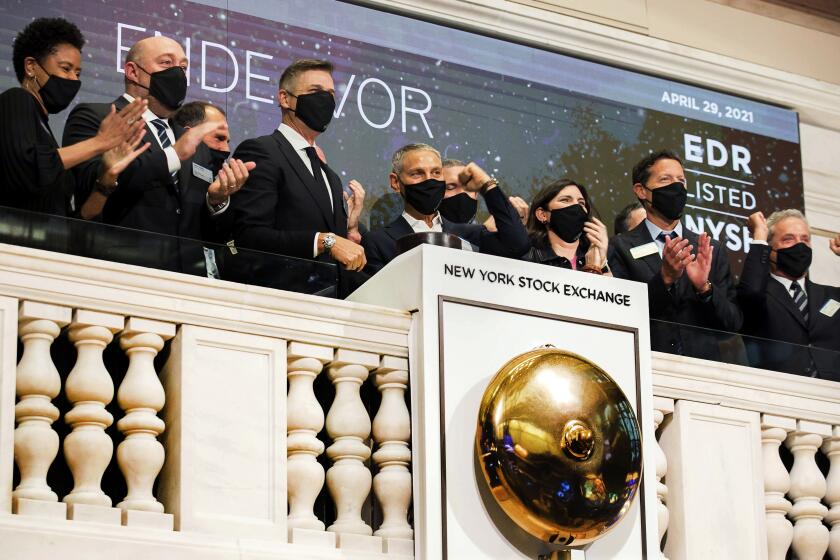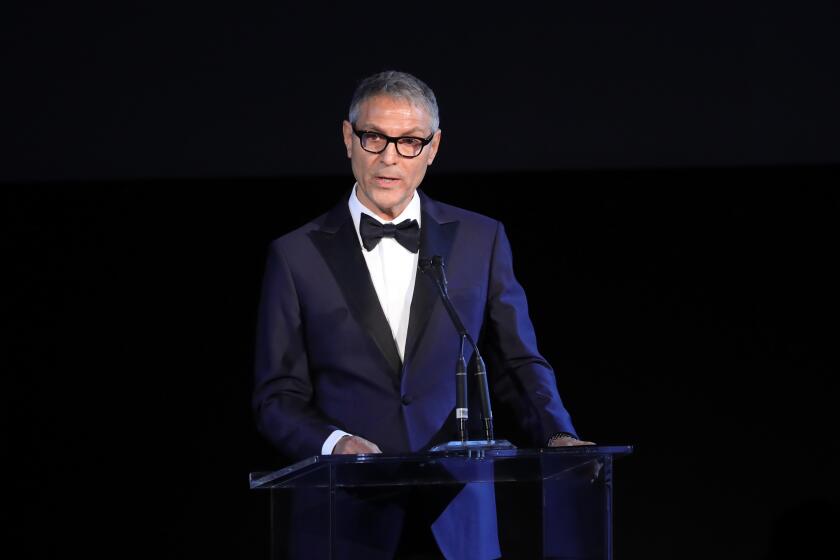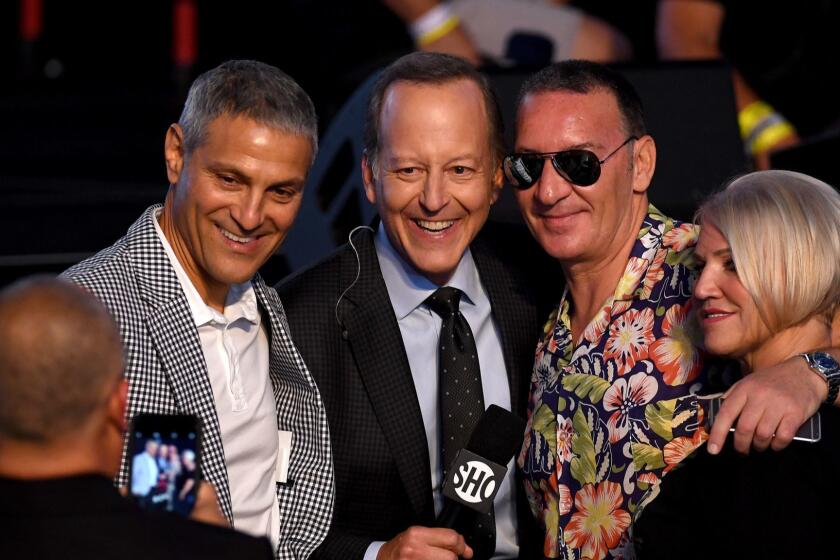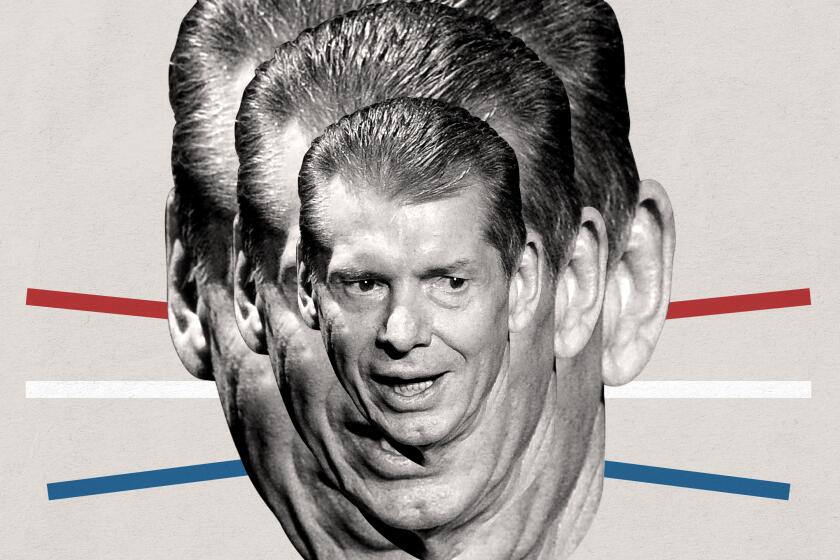Ari Emanuel’s Endeavor flopped on the stock market. Now it’s probably going private again

- Share via
Two years ago, Ari Emanuel’s entertainment conglomerate Endeavor debuted on the public market, becoming the first Hollywood talent agency to do so.
The initial public offering was seen as a test of the brash Hollywood superagent’s long-term vision for the Beverly Hills firm — that pairing live events businesses like Professional Bull Riders, New York Fashion Week and Frieze London art fair with talent representation giant WME would create an “Endeavor flywheel.”
But investors have been skeptical of the central thesis that the value of Endeavor was greater than the sum of its seemingly disparate parts. Late last month, Endeavor signaled it may throw in the towel on being a publicly traded company.
The company on Oct. 25 told investors it was exploring its strategic options, which is often a sign that a company is putting itself up for sale.
“Given the continued dislocation between Endeavor’s public market value and the intrinsic value of Endeavor’s underlying assets, we believe an evaluation of strategic alternatives is a prudent approach to ensure we are maximizing value for our shareholders,” Emanuel said in a statement.
In other words, executives and investors have been frustrated with the company’s low stock price, despite Endeavor’s profitability and revenue gains. As of the day of the company’s announcement, Endeavor’s stock price had fallen to $17.72 a share, down 30% from when it closed at $25.20 on its opening day. The stock has underperformed the S&P 500 this year.
“What Ari has created is an entertainment conglomerate and investors don’t quite see how the parts fit together, especially the synergies between them,” said Lloyd Greif, president and CEO of Greif & Co., a Los Angeles-based investment bank active in the entertainment and media industry. “They don’t get the vision or the strategy.”
Shortly after Endeavor’s announcement, a possible outcome emerged.
Its largest shareholder, private equity firm Silver Lake, said it wanted to take Endeavor private. Silver Lake said in a statement that it “firmly believes in Endeavor’s business” and “is not interested in selling its shares in Endeavor to a third party nor in entertaining bids for assets that are a part of Endeavor.”
The dueling press releases seemed unconventional to some industry observers and raised questions over whether the two companies were on the same page.
Some interpreted Silver Lake’s move as a way to discourage possible buyers from coming forward, thereby reducing the risk of a competitive bidding process. Silver Lake, which has been an investor in Endeavor since 2012, owns 71% of the voting stock; thus it holds enormous sway over Endeavor’s future and a significant stake in its success.
“They can put the company in a bear hug — the only way someone can take Endeavor away from them would be to outbid them, and that’s highly unlikely since Silver Lake has sent a very clear signal they want to take Endeavor private,” Greif said.
Endeavor and Silver Lake declined to comment. In its release, Endeavor said it has not set a deadline for its review process and added, “There can be no assurance that this process will result in any particular outcome.”
Endeavor’s much anticipated initial public offering happened on Thursday. How did Wall Street react?
The nature and history of Endeavor — and its sharp-elbowed Chief Executive, Emanuel — is anything but conventional.
Emanuel founded Endeavor when he and three other agents left ICM to start their own agency in 1995. A security guard saw an assistant taking files and ICM leaders realized papers for the four agents were gone. ICM’s chairman threatened a lawsuit. Emanuel replied, “Listen, I don’t work for you. Do whatever the f— you want.”
In 2009, Endeavor merged with William Morris Agency to become WME. It later bought other companies, among them mixed martial arts league Ultimate Fighting Championship, making it a diversified, expansive entertainment company.
Endeavor planned to launch an IPO in 2019 but later delayed it due to market conditions. During the COVID-19 pandemic, which hammered entertainment businesses including agencies and sports leagues, there were rumors that Endeavor might file for bankruptcy or be sold for parts, though those rumblings never came to anything. Endeavor finally went public in 2021.
Emanuel, who has spoken out about antisemitism, blamed Netanyahu for making Israel vulnerable to “heinous” attacks by Hamas “terrorists.”
In order to succeed on the public market, Endeavor needed to convince investors that putting all these entertainment and live events-related companies together under one group would create a virtuous cycle of A-list talent, brands and events that was more valuable than its pieces.
It also would have to overcome doubts about the talent business, which is notoriously unpredictable, something Wall Street doesn’t usually like. Hollywood agencies make money when clients get work, and their bottom lines are affected when a star defects to another agency, which happens all the time. To adjust for that reality, agencies have diversified their businesses beyond film and TV stars to also represent brands, influencers and sports stars. WME’s clients include Dwayne Johnson and Oprah Winfrey.
Even Emanuel admitted in a discussion at Bloomberg’s Screentime conference last month that “our Endeavor story was a little confusing” for Wall Street.
When Endeavor yanked its IPO on Thursday, the move marked a rare and humbling stumble for Hollywood power agent Ari Emanuel, and left questions about what’s next for his firm.
“There is a strong dislocation between the current stock price of Endeavor and the sum of the businesses and equity interests that the company owns,” said Brandon Ross, analyst at LightShed Partners. “Without strategic action, there is not a line of sight to closing this discount.”
Endeavor has taken steps to try to boost its stock. In April, it made a deal for UFC to merge with World Wrestling Entertainment in a new publicly traded company called TKO. Endeavor owns a 51% controlling stake of TKO and Emanuel serves as the company’s CEO.
But Endeavor’s stock continued to decline and TKO’s share price has dropped 17% since the company went public Sept. 12, reflecting the market’s trepidation around sports rights as cable companies lose more subscribers to streaming services.
Endeavor said it would not consider a sale of its TKO stake as part of its strategic review, but analysts have speculated that the company could look to sell off other assets if it went private.
There also was hope for a halo effect after the majority stake of rival Creative Artists Agency sold at a valuation of $7 billion to Artémis, the investment firm of the billionaire Pinault family. But that optimism was short-lived.
“The market was valuing the non-TKO Endeavor assets as if they were going out of business despite the recent acquisition of CAA at a very high multiple,” Ross said.
Emanuel hasn’t hid his frustration with his company’s valuation. Nor has he suppressed his sometimes combative nature, a trait typical of high achievers in the rough-and-tumble agency business but less common in other public companies, where executives tend to stay buttoned up and stick to bland corporate lingo. On a Freakonomics Radio appearance, Emanuel compared CAA, unfavorably, to Walmart.
Throughout his controversial career, McMahon has faced odds and weathered various scandals while building the world’s largest professional wrestling operation.
At the Bloomberg conference, he took a personal shot at his competitors, calling for CAA’s co-chairmen, Bryan Lourd and Kevin Huvane, to take a leave of absence following an actor’s lawsuit that accused the two agents of discouraging her from reporting a sexual assault. CAA has called the claims baseless.
“We’re worth a lot more and we have more morals and we have a better business,” Emanuel said.
CAA’s Lourd fired back. “We all know Ari Emanuel to be incredibly performative, erratic, and in my mind, always self-serving, much to the detriment of not just his colleagues, but his clients ... and more importantly, his investors,” Lourd said, adding that he was falsely accused in the lawsuit and would address that in court.
Hollywood powerhouse Endeavor, the parent company of UFC, has officially acquired pro-wrestling giant WWE, creating a sports and entertainment giant.
Prices of both Endeavor and TKO rose after Endeavor announced plans to explore alternatives.
Still, broader entertainment industry troubles, including the recently resolved writers’ strike and the ongoing actors’ strike, continue to hurt Endeavor’s business. The dual strikes have halted scripted film and television production for much of this year, at a time when the business is already struggling with the transition to streaming from traditional television. The writers’ strike ended in late September, but the actors strike has continued since mid-July.
“It doesn’t seem like that black cloud will come off of Endeavor anytime soon,” Greif said. “They probably feel like the ‘Peanuts’ character Pig-Pen. They always walk around with a cloud of dust surrounding them that they can’t seem to shake.”
Times staff writer Stacy Perman contributed to this report.
More to Read
Inside the business of entertainment
The Wide Shot brings you news, analysis and insights on everything from streaming wars to production — and what it all means for the future.
You may occasionally receive promotional content from the Los Angeles Times.
















